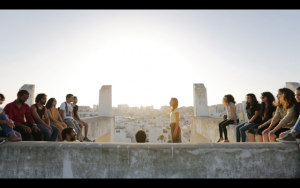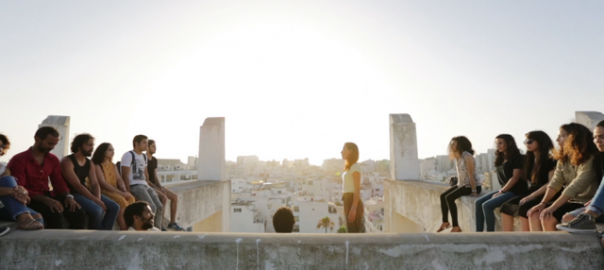The International Women’s Film Festival in Salé offers three types of competition: feature length fiction; fiction shorts; documentaries. The latter is rich in works from all over the world and the Moroccan entry is no exception.

Shakespeare à Casablanca is profoundly Casablancais: coproduced by Nabil Ayouch (Ali’n Productions) and Moroccan TV (2M), it follows a theater troupe through the streets of Casablanca as the director and actors prepare the staging of Shakespeare’s A Midsummer Night’s Dream.
The film is an adaptation on multiple levels: first the play had to be translated from English to the local version of spoken Arabic, Darija (on three different levels, we are told: the darija of yore, Casablanca’s variations, the darija of today’s youth), then it had to be understood, staged and rehearsed for present times in Casablanca. For that purpose, the work was done in partnership with its potential audience. The resulting documentary is a type of “making of” of the play: how does one film the production of the play from start to finish (along, predictably enough, three acts: Beginning of the Summer; Mid-Summer; Night of the Show)? How does one go from Shakespeare’s multi-leveled fantasy to Casablanca’s 21st century reality? The film therefore follows the actors asking people on the street how they would react to the story of star-crossed lovers whose parents forbid them to marry and who decide to flee to the forest. What would you do in that situation, they ask?

The main part of the filmic narrative becomes a fabulous call-and-response between curious passers-by and the probing actors on the streets of Casablanca, thus re-enacting in contemporary times Shakespeare’s play within the play structure in the Dream. In a hilarious scene, one man disagrees with the choice of the forest as an escape route: the lovers should retreat to the sea, to the beach, he repeats this with forceful conviction. Another steps in, addresses the male actor and demonstrates that he needs to project more assurance in order to convince his beloved’s father that his lover is his, and no one else’s. “You need to be more self-confident! You are not good at this! I would marry her! She would follow me everywhere!” Completely taken by his own acting, he ends up in a space that unites Shakespeare’s play and Casa’s reality, as he continues his dialogue with the actor and predicts: “you will marry her, and she will have your son but she will call him Fayçal [his own name], so taken is she with me, with how strong-willed I am!”
Along the way, the troupe asks people what love means. They avoid the bourgeois districts of Casablanca (e.g. the Twin Towers), preferring to interact with the people of poor neighbourhoods. What does love mean? What are the words for it in Darija? The translator mentions houb (love) and z’hou (desire, passion); a taxi driver talks about terms of endearment learned in childhood (e.g. “my little liver”). Between modesty and shame, love is hard to articulate. A young woman states that Moroccans will not and cannot talk about love.
In one of the most moving scenes, actors are asked, early in the process, to talk about a joy of love and a pain of love. Each actor tells his or her story in turn. A young man with sparkling eyes fervently describes the happiness he felt with the beloved young woman to whom he confided everything. Suddenly, his face veiled with sadness, and in an altered voice, he manages to state that the love story had finished. The camera lingers on his face twitching with pain: so moved is he that he can no longer articulate a word. After a silent while, he finally screams.
In the end, the play is staged in an empty cathedral in front of an audience, for free. As the camera films the faces of the people watching the old British bard’s complex play in Darija in today’s Morocco, there is a rare cinematic moment of grace.
Florence Martin
